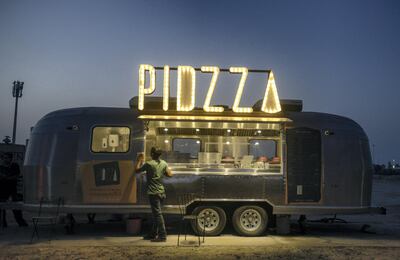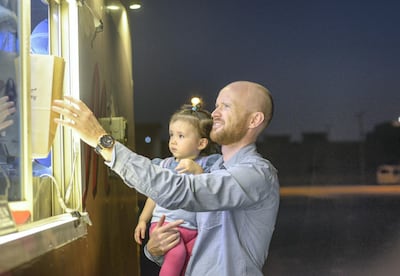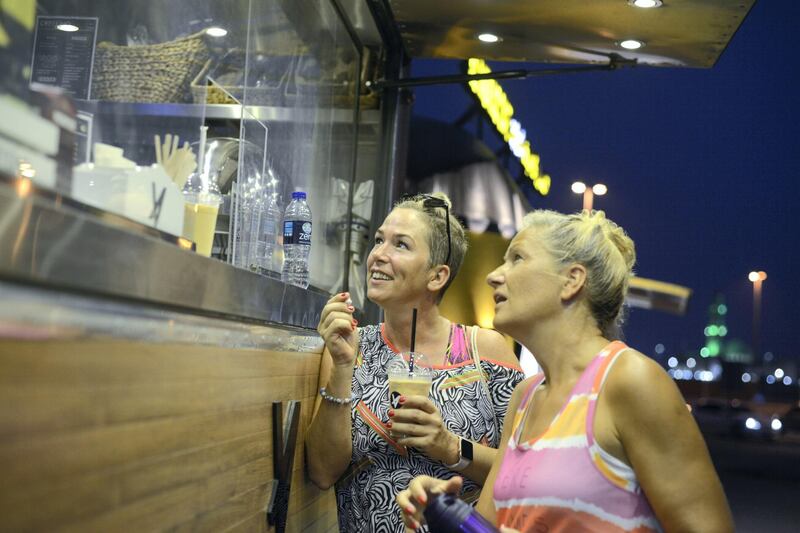As dusk falls and the end of the fast draws near, the lights begin to flicker and the shutters rise on a group of nearly 30 caravans on a patch of dusty ground on the edge of Khalifa City.
This is Khalifa City Truck Park, an informal gathering of food trucks that have brought the neighbourhood to life becoming a place to unwind with friends or for families living nearby in Al Raha Gardens to visit.
Almost the first thing visitors smell on arrival is karak steaming from a black and yellow trailer with two finjans, the small delicate cups without handles that hold Arabic coffee, painted on the truck’s body.
Al Mobaraz Café is the newest truck on the block, having joined the congregation two months ago. Decorated with vintage mosaic bowls that hang from the ordering window, the truck is the only one in the area that serves traditional Emirati snacks.
By the end of 2014, a single truck set up shop outside Raha International School. Since then the park has grown to become one of the most popular destinations in Khalifa City, offering dishes from all over the world.
________________
Read more:
Meet the cooks that make 3,000 litres of porridge a day for fasting Muslims in Dubai
What it takes to put together a successful large-scale iftar
Midnight in Ramadan: The coals burn late into the night in Khalidiya's Family Park
Mobile businesses are on the rise: some ideas you can start today
________________
The first arrival, still preparing food, was 21 Emirati Café. A patch of fake grass greets its visitors as they approach its aluminium tinted glass window to make their orders.
The orange truck, which resembles a small house, is famous for making healthy burgers by steaming the meat rather than frying or flame-broiling it.
Its signature dish is the camel burger served with only organic vegetables and grilled potatoes.
“We explored different areas before we realized that Khalifa City was the one in need most of food outlets. The location of the truck on the road leading to the airport and its presence on a main internal road catalysed its success,” said managing director, Khalid Al Hajeri.
However, the lack of washrooms and a simple dining area limit the customers’ dining experience, he said.
“Simple services would help us all out. I hope the government works on improving the area surrounding the food truck park to make it more hospitable,” said Al Hajeri.
The peak period for sales begins in January with an improvement in the country’s weather but Ramadan has slowed business considerably as families prefer to gather at home.
“In Ramadan, we don’t have as many customers as we do before it,” said Angelica Sarmiento, 21 Emirati Café’s sandwich maker.

MOW, a matte black food truck, share’s their struggles. It has been part of the park for the past six months serving a mixture of American and Italian cuisine.
The park is more subdued during iftar as people rest at home, congregate at home or in Ramadan tents.
“Before Ramadan we used to earn above Dh1,500 per day and now we are lucky if we get Dh600,” said chef Joel Carrillo.
Customers pass between trucks, chatting over the sound of a low hum coming from generators - the trucks’ sole source of energy.
Strings of vintage light bulbs flicker around the ordering window for the Healthy Way truck which serves a wide variety of healthy alternatives to high calorie meals found in other trucks.
Though the Ramadan shift ends at 2am, cooks said they prefer working in food trucks rather than in industrial kitchens.
“It’s less work here for me, it’s not too busy and we prepare the food on the spot or else it gets spoiled,” said chef and barrista Felipe Julio.
The caravans’ relaxed atmosphere is what lured Franklin Mbema, supervisor of Caffeino, to work at the truck.
“I left my job at a four-star restaurant to be here because it’s a lot less stressful even though work timings can be unpredictable. We can be asked to move the trailer at any time to attend an event,” he said.
During Ramadan, midnight is busier than midday in the caravan’s kitchen.
Customers seeking their nightly dose of caffeine begin to trickle into the park by 8pm and the crowd grows in the hours leading up to 1am.
Observing at the scene was a father gently rocking his one-year-old daughter as he waited for his order from Meals Way.
“My wife goes jogging and I meet her here with our daughter. We live in Khalifa city so when we can’t be bothered to cook, we come here,” said Christopher Dysart.

“When it started out, there were only one or two trucks off the roundabout, but now it has changed a lot. There are maybe 20 food trucks and I can see it growing even more,” he said.
At 8pm, two women power-walked towards the Caffeino truck, enjoying the cool of the evening after their run.
“We come here every night during Ramadan after we exercise for a cup of iced coffee,” said Susan Sell, 42.
Her friend, Peggy Kandemir, 40, pointed at the trailer with a wide smile on her face. “If we go there and they see us they will take the chair and the table and set it up in front of the truck,” she said.






